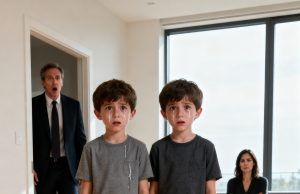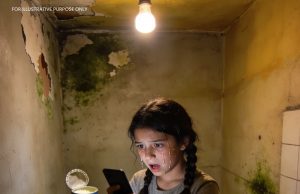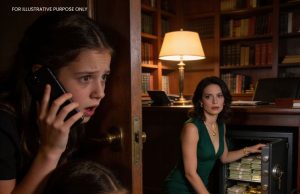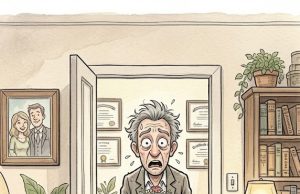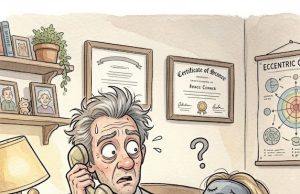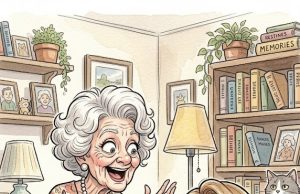The night after my father’s funeral, I sat on the sagging couch of our family home, holding nothing but his old wristwatch in my hands. The ticking seemed louder in the silence, as if mocking the hollow space where his presence used to be. My older sister, Claire, walked past me without a glance, her heels clicking like gunshots on the hardwood floor.

She had inherited the house, the savings, the cars—everything. All I received was the wristwatch, its strap cracked with age, the dial scratched from years of wear. I tried to find comfort in it, to tell myself it meant something sentimental. But I couldn’t shake the bitterness.
Three days later, while I was still raw with grief, Claire barged into the living room with two suitcases. My suitcases. “Pack your things,” she said coldly. “You can’t stay here.”
“What do you mean?” My voice cracked. “Dad wanted us to—”
She cut me off. “Dad wanted me to take care of the estate. You’re twenty-six, Mark. It’s time you figured out life on your own.”
The words sliced deeper than any blade. I had nowhere to go—no apartment, no savings. I’d been working odd jobs, helping Dad through his illness. Now, suddenly, I was homeless.
That night, I sat on a park bench with my bags at my feet, shivering under the autumn chill. Panic clawed at my chest. I scrolled through my phone contacts, unsure who would even answer. Finally, I pressed the number of our family lawyer, Richard Lowell.
“Mark,” he answered, his tone oddly cheerful for midnight. I poured everything out—the eviction, the betrayal, the fear. I expected sympathy. Instead, Richard chuckled.
“I had a feeling this would happen,” he said.
My stomach twisted. “What are you talking about?”
“Your father predicted all of it,” Richard replied. “Come to my office tomorrow morning. There’s something he left for you—something that will change everything.”
I sat frozen, the watch heavy in my palm. My father had been many things—stern, practical, unyielding—but prophetic wasn’t one of them. Still, Richard’s words burned in my mind as the night grew colder.
For the first time since the funeral, I felt something other than despair. I felt a spark of curiosity—and maybe even hope
The next morning, I walked into Richard Lowell’s law office with the wristwatch still strapped to my wrist. My clothes were wrinkled from sleeping in a borrowed jacket on a friend’s couch, and my eyes burned from lack of sleep. The law firm smelled of polished wood and coffee, a stark contrast to the chaos in my mind.
Richard was waiting at his desk, a thin man in his sixties with silver hair slicked neatly back. His smile was unsettlingly calm. “Mark,” he said warmly, “I’m glad you came.”
I sat down, my nerves raw. “What did you mean yesterday? What did my father predict?”
Richard folded his hands. “Your father knew Claire. He knew her ambition, her sense of entitlement. He also knew your loyalty. You gave up your own career to care for him. He wanted to reward that.”
He reached into a drawer and placed a sealed envelope on the desk. The handwriting was unmistakably my father’s—sharp, deliberate strokes. My heart pounded as I tore it open.
Inside was a short letter.
“Mark, if you are reading this, it means Claire has acted as I feared. The house and the accounts are hers by legal inheritance, but not everything I owned was in plain sight. The wristwatch I left you is more than a keepsake. Take it to Richard. He knows what to do. Trust him. And above all, do not let your sister intimidate you. This is your chance to build your life.”
I looked up in confusion. “The watch? This old thing?”
Richard smiled knowingly. “Yes. May I?”
I hesitated, then unclasped the watch and handed it to him. He examined the back, then pressed a nearly invisible groove. To my shock, the back popped open. Inside was a folded slip of paper no bigger than a postage stamp.
Richard carefully unfolded it. Written in my father’s neat script was an address in Boston and a code: Lockbox 42C.
My pulse quickened. “What is this?”
“Your father kept something private—something separate from the estate. He instructed me to tell you only when the time was right.”
Richard leaned forward. “That lockbox contains assets that are legally yours. Investments, accounts, documents—things your sister has no knowledge of. But there’s a catch: you’ll need to go in person, verify your identity, and claim it. It won’t be easy, Mark. Your father wanted to see if you had the resolve to stand on your own feet.”
For a moment, I was speechless. My entire life had shifted in the space of a minute. My sister thought she’d stripped me of everything, but my father had outmaneuvered her.
“When do I go?” I asked finally.
“As soon as possible,” Richard replied. “But be careful. If Claire finds out, she will fight tooth and nail to stop you.”
I tightened the watch back around my wrist. For the first time in weeks, I felt the weight of possibility pressing against my fear. Boston wasn’t far, but the journey promised conflict—not just with my sister, but with myself.
Two days later, I boarded a Greyhound bus bound for Boston with nothing but my duffel bag and my father’s watch. Every mile felt like a step away from the helplessness that had haunted me since the funeral. Still, doubt gnawed at me. What if the lockbox was empty? What if Claire found out and tried to ruin everything?
When I arrived, I made my way to the bank listed on the note. The building was imposing, all granite columns and brass doors, the kind of place that whispered old money. I walked up to the counter and presented the slip of paper.
The clerk examined it, then looked at me with raised eyebrows. “This requires special verification. Do you have identification?”
My hands trembled as I handed over my driver’s license. She disappeared into the back, and for five agonizing minutes I imagined every possible disaster—that they would refuse me, that Claire had already been here, that the code was meaningless.
Finally, the clerk returned with a manager in tow. The manager was a tall man with a firm handshake. “Mr. Collins,” he said. “We’ve been expecting someone on behalf of your father. Please, follow me.”
He led me down a quiet corridor to a secure room lined with small steel doors. At number 42C, he stopped, inserted a master key, and gestured for me to use mine—the tiny brass key Richard had provided along with the letter. My hand shook as I slid it into the lock.
The door opened with a metallic click. Inside was a stack of neatly bound folders and a leather envelope. I pulled them out, my chest tightening.
In the folders were documents: investment portfolios, property deeds, and certificates of deposit worth far more than I’d ever imagined. My father had built a second fortune, hidden away from Claire’s reach. The leather envelope contained a handwritten note:
“Mark, these are yours. I trusted you with little during my life, but I leave this with the faith that you will not squander it. Do not fight your sister for the house. Build your own life. Start anew.”
Tears blurred my vision. I thought of the nights spent caring for him, the resentment I’d felt when he seemed distant, the bitterness when Claire received everything. And now, here was proof that he had seen me all along.
When I left the bank, the autumn air felt different—lighter, sharper. For the first time, I wasn’t just the younger brother, the overlooked son, the homeless outcast. I was someone with a future.
Of course, the road ahead wouldn’t be smooth. Claire would discover soon enough that I was no longer powerless. But instead of fear, I felt resolve.
That night, I booked a cheap motel room and spread the documents across the bed. Boston’s skyline glowed outside the window. My father hadn’t left me with just money; he had left me with a challenge.
The watch ticked steadily on my wrist, no longer a symbol of what little I had, but of the legacy I now carried. And for the first time in years, I believed I could rise to it.


